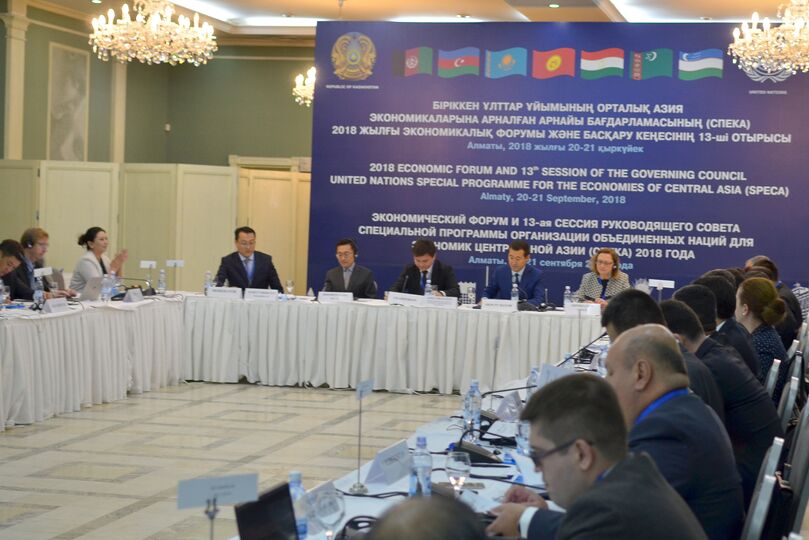On 19-20 September 2018, the SCO delegation attended the Economic Forum and the 13th session of the Governing Council of the United Nations Special Programme for the Economies of Central Asia (SPECA), Twenty Years of SPECA: A New Stage in Regional Cooperation for the 2030 Agenda for Sustainable Development.
The events were held in Almaty under the presidency of the Republic of Kazakhstan and were attended by high representatives of SPECA member states, as well as a number of international and regional organisations.
Welcoming speeches were given by Deputy Mayor of Almaty Yerlan Aukenov, Kazakh Deputy Minister of National Economy Aset Irgaliyev, Head of the ESCAP Subregional Office for North and Central Asia Hirohito Toda and Principal Advisor at the UN Economic Commission for Europe Monika Linn.
Participants discussed how their countries had performed over the previous 20 years in the following areas: transport; trade; energy, information and communications technology; environment; the development of water and energy resources; statistics; and gender equality.
They also focused on structural economic changes and regional integration and cooperation.
In general, all the speeches and discussions fitted in the context of priority directions within the Vienna Programme of Action for Landlocked Developing Countries for the Decade 2014-2024.
SCO Deputy Secretary-General Vladimir Potapenko, who led the delegation of the SCO Secretariat, spoke at a panel session on the progress made in transport, trade, energy and information and communications technology via regional cooperation.
In his report, he noted the activity of SCO countries in the development of a system of transport interconnectivity in the region, and the organisation's efforts to foster cooperation between member states in road transport and to encourage interaction in railway transport.
The SPECA Governing Council summarised the outcome of the organisation's activity over the past 20 years and outlined plans for the near future.
The SPECA presidency for 2019 will be given to Turkmenistan.
The United Nations Special Programme for the Economies of Central Asia (SPECA) was established by the Tashkent Declaration on 28 March 1998.
It was signed by the leaders of Kazakhstan, Kyrgyzstan, Tajikistan, Uzbekistan, as well as the executive secretaries of UNECE and UNESCAP. Later on, Afghanistan, Azerbaijan and Turkmenistan joined the programme.
The SPECA consists of six themed working groups: water, energy resources and the environment; transport; transit and connectivity; trade; statistics; economic development; and gender and economy.
